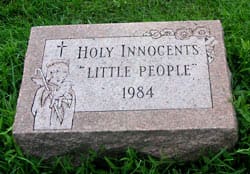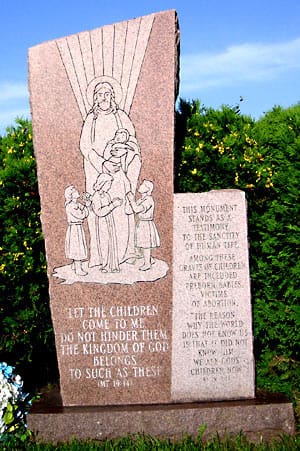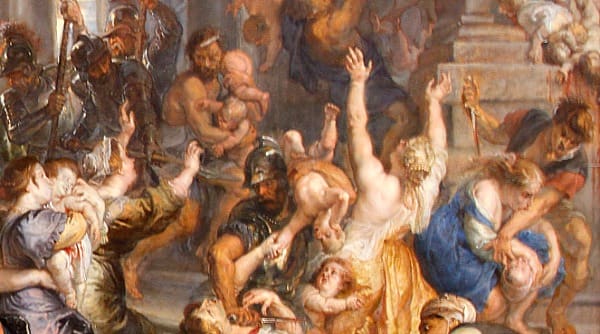I was nine years old, and I was carrying a coffin.
Not just any coffin. This one held the tiny bodies of hundreds of aborted infants rescued from a dumpster, and I was among several children who were participating in their burial service at Holy Cross Catholic Cemetery in Milwaukee in 1984. Pro-life mourners and local media crowded around the gravesite, and I stepped carefully, conscious of how precious a load we bore. I remember the small box being lowered into the ground as we watched solemnly.
The grave marker read, “Holy Innocents” and in time, over a thousand victims of legalized abortion were laid to rest there, given a dignity in death they were denied in their brief lives.
 It’s not the kind of thing one ever forgets, but this time of year our liturgical calendar resurrects the memory in a very poignant way.
It’s not the kind of thing one ever forgets, but this time of year our liturgical calendar resurrects the memory in a very poignant way.
On the fourth day of Christmas, the Church gives to us a somber memorial which concretizes what could very possibly become, thanks to elves and snowmen, an overly sentimental feast of Christ’s birth. Each year, December 28 marks the memorial of the Holy Innocents.
Then Herod, when he saw that he had been tricked by the wise men, was in a furious rage, and he sent and killed all the male children in Bethlehem and in all that region who were two years old or under, according to the time which he had ascertained from the wise men. Then was fulfilled what was spoken by the prophet Jeremiah:
“A voice was heard in Ramah, wailing and loud lamentation, Rachel weeping for her children; she refused to be consoled, because they were no more.” (Matthew 2:16-18)
This day we are asked to remember and honor the lives of the little boys of Bethlehem, cruelly slaughtered by the command of the jealous and grasping Herod. We are reminded that Christ came not only in poverty and humility but in grave danger – our little Savior was a hunted refugee. We recall that Christmas, far from just lights, gifts, and feelings of goodwill, was a real historical moment – when heaven plunged into earth, taking on time and space and shaking the foundations of the world. And evil, sensing the rumblings of its defeat, lashes out at the littlest ones. On this day, we weep with Rachel.
Even then, because we have a God who uses all for good, on this day, the Church gains her first martyrs. It may seem strange: children, not yet of the age of reason, and years before Christ would die for them, to wear a crown meant for saints who died confessing him. But martyrs they are. As the Collect for the day reads: “O God, whose praise the Innocent Martyrs on this day confessed, not by speaking, but by dying, mortify in us all the evils of the vices; that our life also may proclaim in its manners Thy faith, which our tongues profess.”
They confessed him not by speaking, but by dying. They died because of hatred of Christ, and they died in his place. St. Augustine speaks of this “pure host of infants,” saying of these children that they are “justly hailed as ‘infant martyr flowers’; they were the Church’s first blossoms, matured by the frost of persecution during the cold winter of unbelief.”
And so they are the first white-robed souls under the altar in the heavenly temple of Revelation, crying out to God (Rev 6:9-10). May their cries hasten not only his judgments but his healing mercy upon us and our land, and help us to remember, even in the midst of our joyful celebrations, that his coming exacted a steep price then and does so even now. Each of us, should we follow this tiny King, must be ready to lay down our lives – even if it be in the daily death to self that faithfulness demands.
Saints continue their missions even from heaven, and so the Holy Innocents have been given a fitting one: they have been appropriately named as patron saints of babies.
Therefore, we should entrust our own little children, grandchildren, and godchildren to their prayers.
We should beg the Innocents to intercede for the suffering children of the world. I thought immediately of the vacant stares in the faces of dusty, tear-stained orphans in Syria: “There is hope for your future, says the Lord, and your children shall come back to their own country” (Jer 31:17).
And as the gravestone in the Milwaukee cemetery reminds us, we must ask also that their cries in heaven be also those of supplication for this current massacre of innocents, the genocide of abortion, to end. That evil laws, like evil kings, will be no more. But most of all, that his laws – always good and perfect and true – be engraved within us.
“…I will put my law within them, and I will write it upon their hearts; and I will be their God, and they shall be my people…they shall all know me, from the least of them to the greatest, says the Lord; for I will forgive their iniquity, and I will remember their sin no more” (Jer 31:33-34).
Holy Innocents, first small martyrs, pray for us.
This post originally appeared in the National Catholic Register.
Detail of Rubens’ ‘The Massacre of the Innocents’ from Wikimedia Commons.




